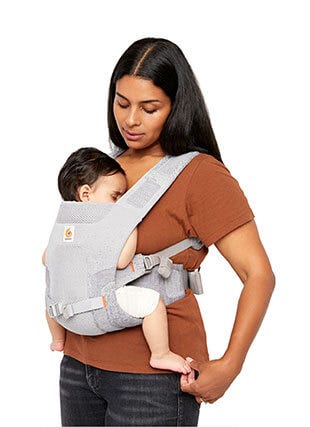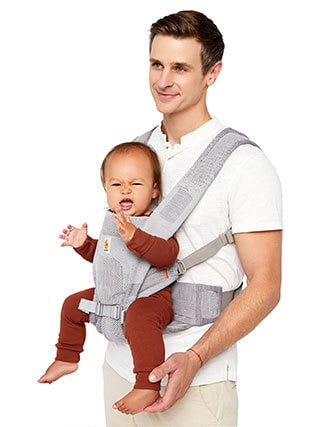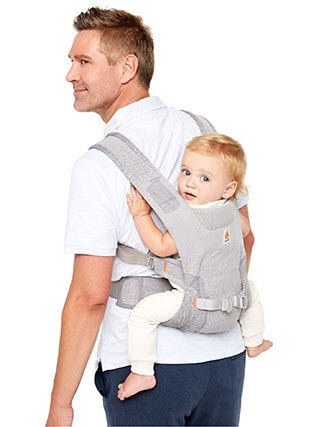
Ergobaby Aerloom Baby Carrier – Desert Rose
Age: 0 - 3 yrs
Made to move, stretch, and fit your daily life, this first-of-its-kind carrier redefines comfort. Ultra-lightweight with built-in airflow and constructed from FormaKnit™ fabric for the ultimate fit.
- Sustainably Sourced Fabric
- ErgoPromise Lifetime Guarantee
- Once this color sells out, it won’t be available again
At A Glance
 Ultimate Fit
Ultimate Fit
 Lightweight
Lightweight
 Built in Airflow
Built in Airflow
 Perfect for on the Go
Perfect for on the Go
Product Description
Product Features
Carry Modes

0+ months

5+ months

6+ months
Comparison
Fit
Instructions
Ages & Stages
Faqs
How long can I use the Aerloom baby carrier in terms of age and weight of baby?
What sizes does the Aerloom baby carrier fit?
How many ways can I carry my baby in the Aerloom baby carrier?
The Aerloom baby carrier has three positions you can use to carry baby:
- Front Carry Inward Facing (in Newborn Mode and Baby mode)
- Front Carry Outward Facing (in Baby Mode)
- Back Carry (in Baby Mode)
Your baby's height and developmental milestones will determine the best mode to use.
- Inward Facing - Newborn Mode: From birth (at least 7 lbs / 3.2 kg and 20 in / 50.8 cm) to 23 in / 58.4 cm (around 2 months). The Aerloom baby carrier adjusts to your newborn baby by threading the back panel through the front loop on the waistbelt.
- Inward Facing - Baby Mode: From 23 in / 58.4 cm (around 2 months) and up to 35 lbs / 15.9 kg
- Facing Out - Baby Mode: Baby has strong head and neck control and is taller than 25 in/63.5 cm (around 5-6 months). Baby’s chin must always clear the top of the panel. For comfortable babywearing for parent in the Facing Out position we recommend a maximum weight of 25 lbs / 11.3 kg.
- Back Carry - Baby Mode: Baby can sit upright unassisted and is taller than 26 in / 66 cm. This is usually around 6 months.
Please refer to the instruction manual and instruction videos for each carry mode before using your Aerloom carrier and before attempting new modes or positions.
When is baby ready to be carried in Baby Mode (versus the Newborn Mode)?
When is baby ready to Face Out?
As a parent, how do I decide which mode is better for my child: newborn mode, facing in (baby mode), or facing out (baby mode)? And how can I know?
Knowing which mode to carry baby in will depend on baby’s height and the developmental milestones they’ve hit. Newborns under 23 in/58.4 cm should be carried in the Facing In (Newborn Mode) position with the back panel threaded through the front loop on the waistbelt.
However, once they reach 23 in/58.4 cm, you can begin carrying in the Facing in (Baby Mode) position with the unthreaded carrier.
As your baby grows older and taller (reaches height of 25 in/63.5 cm), has strong head & neck control, and has a natural curiosity to see and interact with the world, they are ready for front-outward carry. We recommend starting with short durations (5-10 minutes) to prevent over-stimulation.
Here are some signs that baby is becoming over-stimulated and ready to switch back to baby facing in mode:
- Baby seems tired, cranky, or fussy
- Baby is rubbing its eyes
- Baby is spreading fingers and toes, making fists
- Baby is laying hands in front of face
- Baby is ‘spacing out,’ sometimes baby will turn away and simply space out
- Baby is turning away again and again, trying to ‘switch off’
- If this all becomes too much for baby, baby may become drowsy
- Baby becomes hyper-vigilant (overly attentive). Instead of relaxed, baby’s body may stiffen
If you notice these cues, we recommend switching baby to inward facing carry position.
Can I carry my newborn baby in the facing out position?
No. You should never carry your baby facing out until the following developmental milestones are met:
- Once they are over 25 in/63.5 cm
- Display good head and neck control
- Chin clears the back panel when in good positioning
So 5-6 months old.
I heard that babies could get overstimulated when facing out in a baby carrier. How can I spot the cues and how should I respond?
Babies are born with an immature nervous system and are easily overstimulated by too much noise, activity, and sensation in the world around them. Baby simply cannot process it all and needs some quiet time, a way to relax, and a moment (or more!) to calm down.
Once your baby's chin clears the front panel of the carrier (reaches height of 25 in/63.5 cm), has strong head & neck control, and has a natural curiosity to see and interact with the world (so around 5-6 months old), they are ready for front-outward carry . We recommend starting with short durations (5-10 minutes) to prevent over-stimulation.
Here are some signs that baby is becoming over-stimulated and ready to switch back to baby facing in mode:
- Baby seems tired, cranky, or fussy
- Baby is rubbing its eyes
- Baby is spreading fingers and toes, making fists
- Baby is laying hands in front of face
- Baby is ‘spacing out,’ sometimes baby will turn away and simply space out
- Baby is turning away again and again, trying to ‘switch off’
- If this all becomes too much for baby, baby may become drowsy
- Baby becomes hyper-vigilant (overly attentive). Instead of relaxed, baby’s body may stiffen
If you notice these cues, we recommend switching baby to inward facing carry position.
Can I breastfeed with the Aerloom baby carrier? How does that work?
How do I wear the Aerloom carrier waistbelt?
The waistbelt should be secured high and tightly around the wearer’s body. For smaller babies or for adults with long torso, wear the carrier waistbelt higher on body so baby’s head is positioned close enough to kiss.
In the Newborn mode, the back panel should be threaded through the front loop of the waistbelt. This ensures a more narrow and shorter back panel for smaller babies.
In the Baby mode, the carrier will be unthreaded, and the waistbelt will be secured high enough along your torso and hang like an apron.
As reference, the product labels along the waistbelt should always be on the inside and the waistbelt buckle should always be facing out.
We recommend browsing and watching the instruction videos for step by step instructions
Can the shoulder straps be crossed?
How do I make sure my baby’s head is supported with the Aerloom baby carrier?
How do I make sure my baby’s hips are in an ergonomic spread-squat position (M-Position) with thighs well supported and baby's back supported in a natural position in the Aerloom carrier?
How does the Aerloom differ from the other Ergobaby soft structured carriers like the Adapt and Omni 360?
In addition to the way it is innovatively made, Aerloom is a lighter and more streamlined option for carrying from birth up to 35 lbs/15.9 kg. Many of our other carrier models are more structured, with increased padding in the shoulder straps and can carry baby up to a slightly higher weight limit (up to 45 lbs/20 kg). Additionally, other structured carriers may have more adjustments for versatility in carry positions (hip) and features (hood). If you want an innovative yet streamlined baby carrier that fits to you without the "bells and whistles", Aerloom is a great option. Otherwise, we invite you to check out our other great carriers too!



























